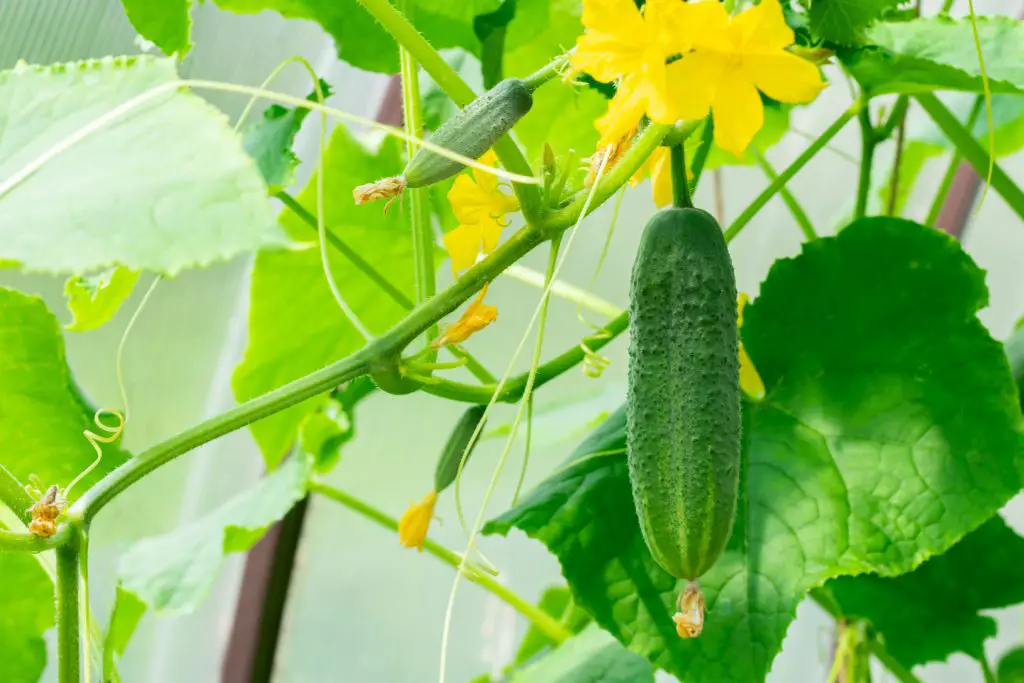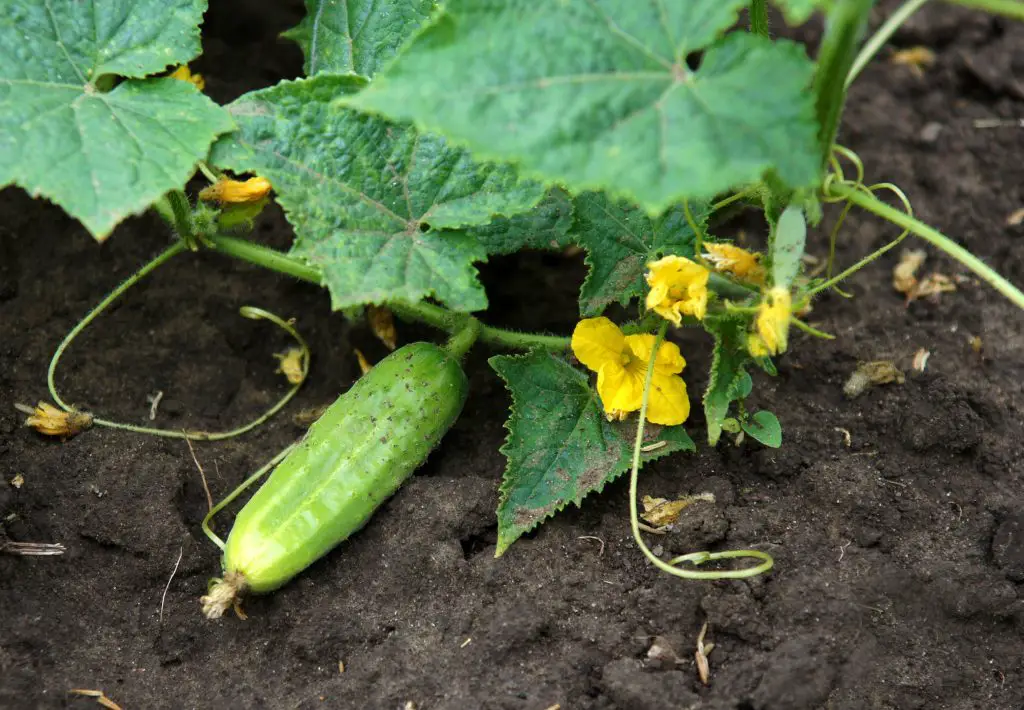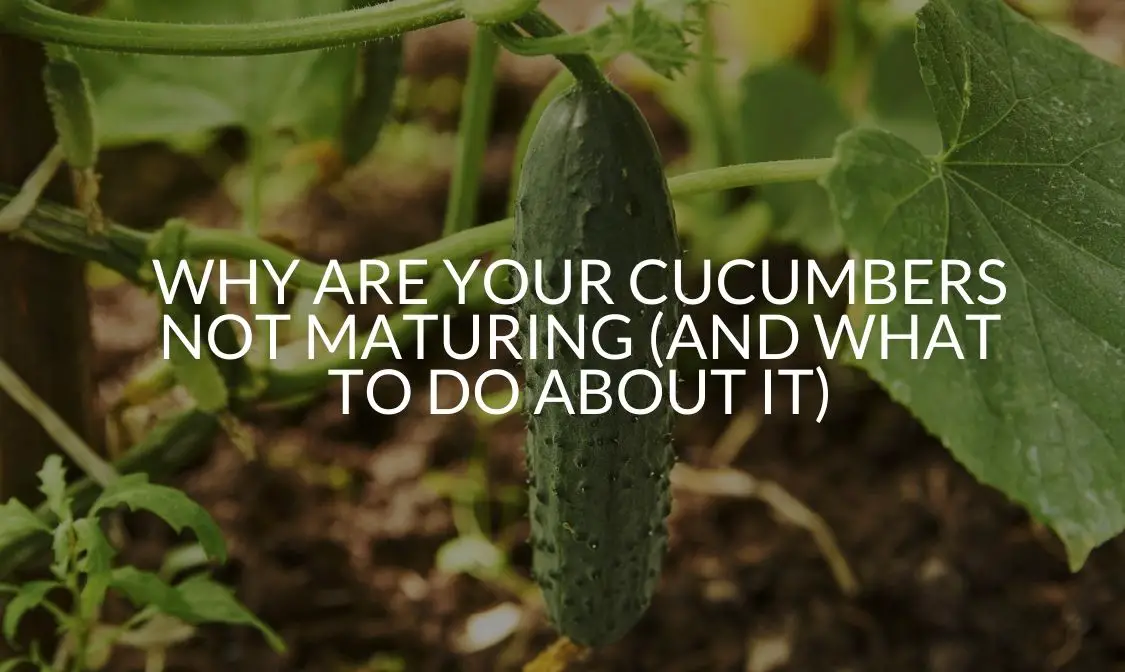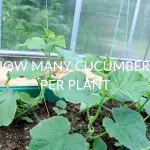Cucumbers are a scrumptious snack that can be a great vegetable to grow for beginner gardeners. The green garden fruit is delicious on any occasion but getting them to grow can be difficult. Cucumbers not maturing can be problematic but it is not the end of the world!
There are many reasons for cucumbers not maturing including a lack of pollination, disease, and more. Luckily, there are solutions to help reach cucumbers reach maturity more quickly.
Why Are Your Cucumbers Not Maturing?
Cucumbers refuse to mature for a number of reasons like nutrient deficiencies. They may also do so because they have not been pollinated.
Most cucumber maturity problems are solvable with swift intervention.
Cucumbers are relatively easy to grow but they require a sufficient amount of nutrients and care. A cucumber cannot thrive without adequate soil, proper sunlight, daily watering, and most important of all, pollination.
Cucumbers Have Not Been Pollinated
Pollination is the process when the male cucumber flower transfers pollen from its stamen to the female flower stigma. In the outdoors, cucumber relies on insects like the bee to pollinate its fruit. Cucumbers grown indoors do not have natural pollinators to transfer their pollen from male to female flowers.
Hand-pollination is used on indoor-grown cucumbers in place of the most helpful pollinator, bees. Hand pollinating your fruit guarantees that you pollinate each fruit individually. Pollination is necessary for creating cucumber fruit. When you hand pollinate your indoor fruit, you can account for each cucumber individually and guarantee that it was pollinated.
In addition to helping complete your pollination, hand-pollinating can result in higher, more consistent crop yields. The uniformity among your cucumbers creates more substantial yields overall!
Cucumbers Are Not Being Grown in the Right Conditions
Cucumbers require sunny environments with warm temperatures. The ideal cucumber growing conditions are around 75°F and 85°F.
Adequate cucumber raising requirements include:
- Must be grown in full sunlight
- Cucumbers grow best in loose sandy loam soil.
- Planted in nutrient-rich soil
- Grow in weather between 75°F and 85°F.
- Water your plants weekly.
- Use fertilizers.
Cucumber grows best in sunny areas so it is best to avoid planting cucumbers outdoors in places that do not receive sunlight. Meeting cucumber growing conditions will help your cucumber grow sufficiently.
Cucumber Plant Disease
Plant disease is a common reason why you might notice cucumbers not maturing in your garden. There are many types of diseases that can prevent your cucumber fruit from growing. Bacterial wilt, root rot, and mildew are all common diseases.

What Can You Do To Help Your Cucumbers Mature?
There are several things that you can do to help your cucumbers mature but first, you must figure out what is causing your plant’s stunted growth. For instance, if your cucumber is not pollinated correctly, you can perform hand pollination. Cucumbers that are not getting enough nutrients can be fed fertilizers. There are many other methods too that can help cucumbers mature.
Pushing along the maturing process is sometimes necessary when growing cucumbers indoors. Without helpful pollinators, there is no one to secure the pollination process.
Furthermore, cucumbers require special growing conditions. If the weather or growing conditions are inadequate, you may want to reconsider where you are growing your cucumbers. The location you grow your cucumbers makes a significant impact.
Hand-Pollinate Your Cucumbers
Pollination helps cucumbers mature. If your cucumbers are not maturing because of pollination problems, this is your solution.
Indoor growing relies on human, hand-pollination. That means you will need to use a tool of your choice to physically collect pollen from the male stamen. Then, distribute the pollen onto the female stigma.
Signs of successful pollination should show within just a few short days. Key signs of success pollination include when the flowers have already withered away and a growing cucumber fruit!
Feed Cucumbers Water Soluble Plant Food Weekly
Feeding your cucumbers water-soluble plant food every week gives your plants the nutrients they need. Cucumbers that struggle because of poor soil or sunlight can make up for these inadequacies through fertilizers!
Water-soluble plant food is a plant food with nutrients already dissolved in its water. Pre-dissolved nutrients make it easier to absorb nutrients.
When nutrients are easier to absorb, your cucumber will grow more efficiently! That means, more supple and delicious cucumber fruits!
There are many types of plant foods to choose from including basic fertilizers, all of which can be purchased at your local gardening store. Choose one that feels right depending on your gardening preference.
Get Rid of Cucumber Beetles
The cucumber beetle is a common reason for your cucumbers not maturing. Cucumber beetles carry several diseases that are fatal to your cucumbers. Once they begin feeding on your cucumber’s vines, the bacteria will slowly spread unless it is contained.
The cucumber beetle is one of the most problematic pests for cucumber gardeners because of the damage it can do to your cucumbers. Cucumber beetles love to eat seed tissue so if you are very unlucky, your cucumbers may never mature past germination.
Maintain a strict regimen on your cucumbers to deter cucumber beetles from taking refuge here.
Take care of cucumber pests immediately using a store-bought or homemade insect remover. Consider using pest repellents in the future to make your garden inhospitable to gardening pests. Remember, never compost infected plants!
What Are the Possible Cucumber Diseases?
Cucumbers are prone to many plant diseases which can be dangerous to your cucumber. Many plant diseases prevent your cucumber plant from growing past.
Common cucumber diseases include the popular angular leaf spot, bacterial wilt, and more. A cucumber garden that is infested with pests should be treated to eliminate the garden of bugs.
Some diseases can spread rapidly. Knowing the signs of different diseases can be helpful so you can save your cucumber plants!
Cucumber Bacterial Wilt
Bacterial wilt is caused by bacterial wilt pathogens like the bacterium Erwinia tracheiphila. Wilt infects your plant and prevents it from absorbing nutrients. Eventually, your cucumber plant will die.
All plants wilt differently. Most often, bacterial wilt can be identified by the yellowing and browning of leaves.
Treating your cucumbers immediately prevents bacterial wilt from spreading. The longer you delay, the more likely the bacteria wilt will spread. Pesticides cannot help manage this treacherous plant disease.
Key features of cucumber bacterial wilt:
- Pesticides do not work on cucumber bacterial wilt.
- Control cucumber beetles and you will control cucumber bacterial wilt.
Cucumber Angular Leaf Spot
Angular leaf spot is a disease that can be identified by the water-soaked spots on your cucumber leaves. The bacterium Pseudomonas syringae is a viral infection that begins to cause water spots. Cucumber angular leaf spot may also be referred to as powdery mildew because your leaves will eventually break to pieces.
Leaf spots are most likely to take place during warm, rainy weather in summer. Cucumbers are prone to angular leaf spots because of the warm, tropical climates they grow in.
Angular rot spreads through seeds and soil transmission. Transmission occurs when the soil has become infested by angular leaf spot disease.
Peroxide sprays are great angular leaf spot treatments can preventatives. Use an 8-12 tablespoons hydrogen peroxide to 1-gallon water solution. A daily mouthwash and water solution is also great at killing mildew germs. Bacteria are killed by both of these solutions.
Root Rot
Root rot, or phytophthora crown, is a very common reason why cucumbers do not mature.
Root rot happens when pests eat at your roots and cut off your cucumber’s vital source of nutrients. A lack of nutrients often leads to wilting.
Root rot often occurs in places that receive heavy rain or have poor drainage. Wilting as a result of root rot is common and it can be treated if you recognize the signs early on.
Common signs are discoloration or browning of leaves.
Vine Borer
Vine borers are dangerous pests that can be identified by the yellow frass on the outside of cucumber stems. Adult vine borers emerge in late June or early July from the center of cucumber vines.
As vine borers emerge from the cucumber stem, they leave behind eggs that will remain until treated!
Insecticides will not work against vine borers. Vine borers are embedded deep inside cucumber vines and require you to cut out the infected area with a sharp knife.
Signs that you are experiencing vine borers include yellow frass outside your cucumber stem. Cut this area out before the borers spread to the rest of your cucumber plant.

Recap
Cucumbers are a great plant for beginners. They are easy to grow and maintain. However, cucumbers face their fair share of problems like cucumbers not maturing.
There are many reasons for cucumbers not maturing. The most common reasons for cucumbers not maturing are because they have not been pollinated, they are infected with a disease, or they are being grown in the wrong conditions. Luckily, there are solutions for helping your cucumber mature like hand-pollination or using fertilizers for increased nutrients!
Providing your cucumbers the best growing environments helps them thrive. Bees are the best pollinator for cucumbers but these cannot be used indoors. Use hand pollination to pollinate your indoor cucumbers and create the best cucumber yield!


